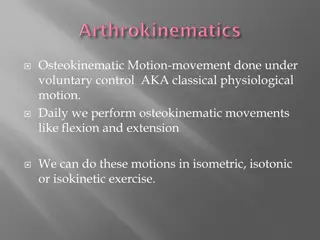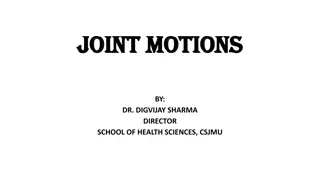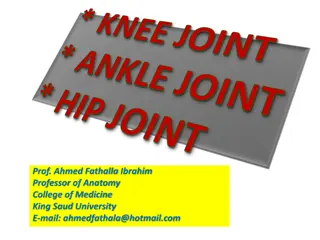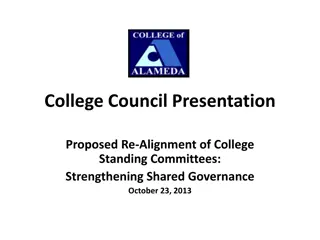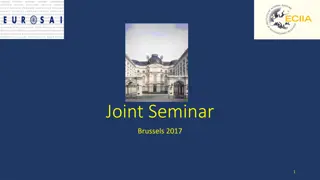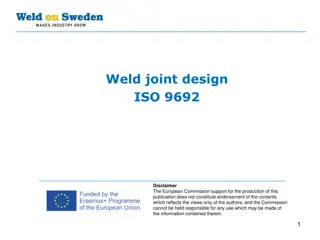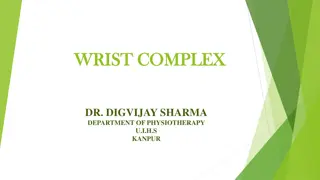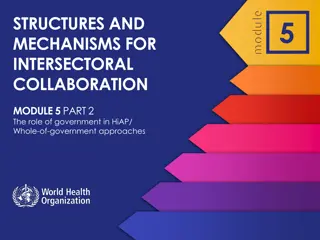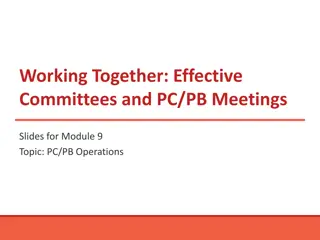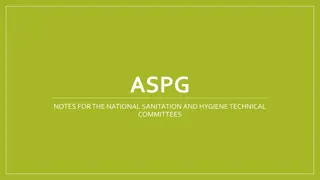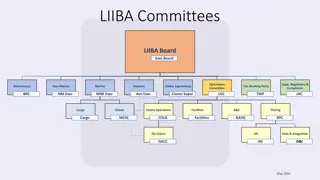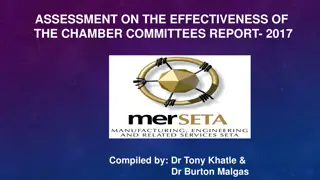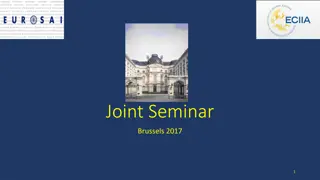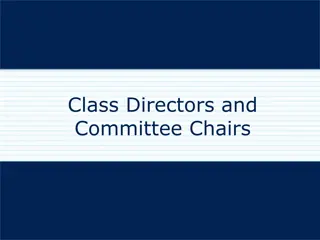Practical Aspects of Joint Committees - April 2018
Explore relevant joint committees including JC 323 for building management and domestic workers, JC 145 for horticultural enterprises, and JC 337 for the non-profit sector. Learn about job classifications, applicable salary scales, and employer interventions in transport expenses for workers in these sectors.
Download Presentation

Please find below an Image/Link to download the presentation.
The content on the website is provided AS IS for your information and personal use only. It may not be sold, licensed, or shared on other websites without obtaining consent from the author. Download presentation by click this link. If you encounter any issues during the download, it is possible that the publisher has removed the file from their server.
E N D
Presentation Transcript
Information on joint committees: practical aspects April 2018 1
Relevant joint committees 1) Joint committee for building management, real estate agents and domestic workers (JC 323) Joint committee for horticultural enterprises (JC 145) Auxiliary joint committee for the non-profit sector (JC 337) 2) 3) 2 April 2018
Joint committee for building management, real estate agents and domestic workers (JC 323) Scope "Domestic workers and their employers also fall within the remit of the Joint committee for building management and domestic workers. "Domestic worker" means any worker hired under a domestic work contract." A domestic work contract is a contract by which a worker undertakes to perform, for an employer as a natural person, works that are mainly: housework, manual work, work carried out for the purposes of the employer's household or his/her family. 3 April 2018
Joint committee for building management, real estate agents and domestic workers (JC 323) Job classification Domestic workers belong to group 4 of the collective labour agreement defining occupational categories Group 4 is composed of 3 categories that evolve according to the worker's experience. 4 April 2018
Joint committee for building management, real estate agents and domestic workers (JC 323) Applicable salary scales Category 1 Category 2 Category 3 Per hour Per month Per hour Per month Per hour Per month Experience 0 9,8642 1624,26 10,3283 1700,73 11,2672 1855,33 + 6 m. 10,1259 1667,39 10,6128 1747,64 11,5777 1906,47 + 12 m. 10,2421 1686,52 10,7398 1768,46 11,7157 1929,20 5 April 2018
Joint committee for building management, real estate agents and domestic workers (JC 323) Employer's intervention in the transport expenses Beneficiaries: All white-collar workers, blue-collar workers and domestic workers. Means of transport All public and private means of transport. Amount of the employer's intervention Public transport: 100% of the amount actually paid by the worker Private transport: 50% of the price for a one-month train card in 2nd class. Distance Transport by rail : no minimum. Private transport: equal or superior to 3 km. 6 April 2018
Joint committee for building management, real estate agents and domestic workers (JC 323) End-of-year bonus No provision for domestic workers 7 April 2018
Joint committee for horticultural enterprises (JC 145) Scope The Joint committee for horticultural enterprises is competent, in particular, for the: installation and/or upkeep of parks, gardens, sport and recreation grounds or green zones by direct labour, when these activities constitute the main occupation of the company workers; NB: the collective labour agreements are attached to the informal joint sub-committee for the installation of parks and gardens 8 April 2018
Joint committee for horticultural enterprises (JC 145) Job classification Category 1: Worker without experience nor training in the green sector, performing his/her tasks without autonomy Category 2: - Worker falling within the scope of category 1 after 18 months of seniority - Experienced basic worker under the responsibility of another person having a relative autonomy in the execution of the tasks requested Category 3: Worker exercising all technical functions in an autonomous way Category 4: Same as category 3 which also directs one or more workers from the lower categories Category 5: - worker who directs category 4 workers - category 3 worker with at least 10 years of experience in the parks and gardens sector - category 4 worker with at least 5 years experience in the parks and gardens sector 9 April 2018
Joint committee for horticultural enterprises (JC 145) Applicable salary scales 18A 17A 16 and 15A 70% 8,79 9,07 Category 1 2 3 4 5 3 with 10 years exp. 4 with 5 years exp. 14,84 100% 12,56 12,95 13,76 14,08 14,84 14,84 85% 10,68 11,01 11,70 10 April 2018
Joint committee for horticultural enterprises (JC 145) Seniority bonus: After 5 years of service in the company: 0,5 % After 10 years of service in the company: 1 % After 15 years of service in the company: 1,5 % After 20 years of service in the company: 2 % 11 April 2018
Joint committee for horticultural enterprises (JC 145) Employer's intervention in the transport expenses Compensation when using public transport: reimbursement of 100% of the costs incurred Bicycle: 0,22 EUR/km Other means of transport : Condition: to be domiciled at 5 km and more Per day: 65% of 1/65 of the effective price at 139% of the quarterly train card. Example: the quarterly train card costs 200 EUR. 200x139% = 278/65 x 65% = 2,78 EUR/day to repay to the worker 12 April 2018
Joint committee for horticultural enterprises (JC 145) Work clothes The employer is required to provide work clothes: blouse or a duster, intended to prevent the worker from getting dirty, because of the nature of his/her activities Either overalls, or a set consisting of a pair of trousers and a jacket or a blazer, a The employer is also responsible for the upkeep of these work clothes. After a risk analysis, the employer can nevertheless allow the worker to do it himself/herself for a weekly allowance of 2,99 (indexable and prorated amount according to the actual number of working days) 13 April 2018
Joint committee for horticultural enterprises (JC 145) Ecological vouchers: What is it ? This kind of voucher can be used to purchase "green" products and services. For whom ? Workers who can attest to 30 days worked or assimilated during the reference period from July 1st to June 30th. How much ? 250 to prorate according to the working time and the actual and assimilated work 14 April 2018
Joint committee for horticultural enterprises (JC 145) Welfare fund: A collective labour agreement concluded within the sector establishes a Welfare Fund called "Social Fund for the installation and/or upkeep of parks and gardens." Purposes: the collection of contributions necessary for its running the financing, allocation and guarantee of the payment of the additional social benefits to be set by collective agreement concluded within the Joint committee for horticultural enterprises, made compulsory by Royal decree, for the benefit of the workers concerned, to ensure the financing and the organization of the union training for blue-collar workers, the reimbursement to employers of certain expenses incurred by them for their workers in accordance with a collective labour agreement 15 April 2018
Joint committee for horticultural enterprises (JC 145) Loyalty premium (paid by the Fund): Only the blue-collar workers with at least 6 months of service in the company are eligible for a loyalty premium The seniority condition will be evaluated each year at the end of the reference period, that is, on July 1st of each calendar year This premium is set as follows: from 0 to 5 consecutive years of service in the sector: 6% ; from 5 to 15 consecutive years of service in the sector: 7%; more than 15 consecutive years of service in the sector: 8,5% ; and this, in relation to the gross wage earned for the days worked in the sector during the reference year. "Reference year" refers to: the period from July 1st of the previous year to June 30th of the year during which the premium is paid. The premium is paid to the worker between December 10th and December 15th 16 April 2018
Joint committee for horticultural enterprises (JC 145) Lump-sum premium for regular workers: Bonus paid every year on July 1st On the basis of the services performed between July 1st of the preceding year and June 30th The amount of the premium is linked to the consumer price index. It is set to 57,12 as of January 1st, 2018 Prorated for part-time workers or workers who do not show proof of a full occupation period The amount can be converted into an equivalent benefit through a company collective agreement April 2018 17
Joint committee for horticultural enterprises (JC 145) Lump-sum premium for workers working less than 30 days: Premium paid in December On the basis of the services performed between July 1st of the preceding year and June 30th The amount is set at 35 . Prorated for part-time workers or workers who do not show proof of a 29 days occupation period The amount can be converted into an equivalent benefit through a company collective agreement 18 April 2018
Joint committee for horticultural enterprises (JC 145) Other benefits: - Additional days off and plan for the employment of older workers (paid by the employer and reimbursed by the Fund) Allowance for long-term sickness (paid by the Fund) Allowance for situations when workers cannot work due to bad weather (paid by the Fund) Possibility of staff training reimbursed by the Fund, . - - - - 19 April 2018
Auxiliary joint committee for the non-profit sector (JC 337) Scope This joint committee is competent for the organizations in the non-profit sector if no other specific joint committee applies. Job classification The joint committee has not adopted any scale specific to the sector. The Guaranteed Average Monthly Minimum Income defined by the collective labour agreement no. 43 of the National Labour Council therefore applies to the workers falling within the scope of the JC 337. 20 April 2018
Auxiliary joint committee for the non-profit sector (JC 337) Applicable salary scales for white-collar workers and blue-collar workers: 18 years 19 years 20 years 0 month seniority 6 months seniority 12 months seniority Per month 1562,59 1604,06 1622,48 Per hour 9,4894 9,7413 9,8531 21 April 2018
Auxiliary joint committee for the non-profit sector (JC 337) Salary scales applicable to workers under student occupation contract Per month Per hour 20 years 94% 1468,83 8,9200 19 years 88% 1375,08 8,3507 18 years 82% 1281,32 7,7813 17 years 76% 1187,57 7,2120 16 years and under 70% 1093,81 6,6426 22 April 2018
Auxiliary joint committee for the non-profit sector (JC 337) Employer's intervention in the transport expenses The joint committee has not adopted any specific CLA. The procedures provided for by the CLA 19 octies of the National Labour Council therefore apply to the workers within the remit of JC 337 This intervention is limited to workers using public transport. It corresponds to an intervention of 75% on average in the pass (train, tram, metro or bus). NB: For the means of transport other than the train, when the price is fixed, irrespective of the distance, another type of calculation is used 23 April 2018
Auxiliary joint committee for the non-profit sector (JC 337) End-of-year bonus No provision for the workers falling within the scope of this joint committee. 24 April 2018
Wages indexation The amounts included in this presentation are valid as of April 1st, 2018. Being subject to the indexation system, these amounts are regularly adapted. You can consult them on the following website, for each joint committee: www.salairesminimums.be 25 April 2018
Joint committees: important information The correct collection of social contributions can only be ensured if the National Social Security Office (NSSO) assigns the index adapted to the activity of the workers. This may have important implications, particularly with regard to the payment of contributions to the Welfare fund. By default, the NSSO assigns the index 032, which corresponds to an embassy employing only staff belonging to the joint committee 337. Information on the staff categories must be sent to the NSSO Identification service by email at the following addresses: idfr@onss.fgov.be or idnl@onss.fgov.be 26 April 2018
Working time in the embassies Provisions on working time are governed by the Law of 14 December 2000 laying down certain aspects of the organization of working time in the public sector NB: a judgement of the Brussels Labour Court of 7 October 2015 states that it is the Law of 16 March 1971 on Labour (private sector of the Belgian economy) which applies to embassy workers who do not benefit from a privileged status. The Federal Public Service Employment, Labour and Social Dialogue does not share this point of view. However, this position cannot prejudge the sovereign power of appreciation of the labour courts and tribunals. 27 April 2018
Useful information For general questions regarding working conditions and remuneration: Contact Center of the Supervision of Social Laws Directorate: By phone from Monday to Friday from 9 to 12 and from 14 to 16.30 at 02 235 55 60 (in French and German) and at 02 235 55 55 (in Dutch) By email to info.cls@emploi.belgique.be (in French), info.cls@beschaeftigung.belgien.be (in German) andinfo.tsw@werk.belgie.be (in Dutch) 28 April 2018


